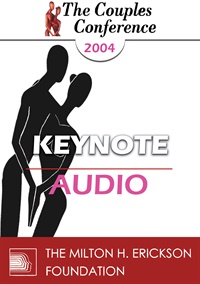
- Average Rating:
- Not yet rated
- Topic Areas:
- Keynotes | Couples Therapy | Neurobiology | Neuroscience | Therapist Development
- Categories:
- Couples Conference | Couples Conference 2004
- Faculty:
- Pat Love, EdD
- Duration:
- 58:32
- Format:
- Audio Only
- Original Program Date:
- Mar 28, 2004
- Short Description:
- During the past five years, the field of neuroscience has given us an overwhelming amount of information related to couples therapy. It is now up to us as clinicians to integrate this knowledge into our practice. Join the challenge, as we use these exciting new facts to help couples move from the relational log-jam to lasting change.
- Price:
- $15.00 - Base Price
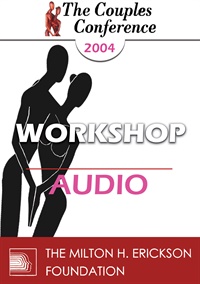
- Average Rating:
- Not yet rated
- Topic Areas:
- Workshops | Couples Therapy | Anger | Therapist Development
- Categories:
- Couples Conference | Couples Conference 2004
- Faculty:
- Peter Pearson, PhD
- Duration:
- 2:02:37
- Format:
- Audio Only
- Original Program Date:
- Mar 28, 2004
- Short Description:
- Chronically angry, hostile, distancing and rigid couples are a clinical and personal challenge. In this workshop, you will learn to change the trajectory of therapy as soon as entrenched patterns are noticed, to stay out of their conflict, and stay calm in the middle of their storm.
- Price:
- $15.00 - Base Price
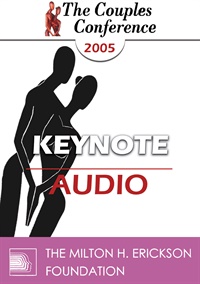
- Average Rating:
- Not yet rated
- Topic Areas:
- Keynotes | Couples Therapy | Therapist Development
- Categories:
- Couples Conference | Couples Conference 2005
- Faculty:
- Sue Johnson, EdD
- Duration:
- 1:05:34
- Format:
- Audio Only
- Original Program Date:
- Mar 06, 2005
- Short Description:
- For the first time couple therapists can truly be scientific practitioners. We know more and more about the nature of the problem - marital distress and the nature of adult love. We also can specify which interventions work and how they work. We have maps, targets, directions and a way home.
- Price:
- $15.00 - Base Price
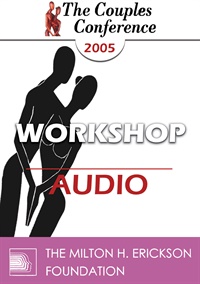
- Average Rating:
- Not yet rated
- Topic Areas:
- Workshops | Couples Therapy | Developmental Therapy Model | Confrontation | Therapist Development
- Categories:
- Couples Conference | Couples Conference 2005
- Faculty:
- Ellyn Bader, PhD
- Duration:
- 1:45:16
- Format:
- Audio Only
- Original Program Date:
- Mar 05, 2005
- Short Description:
- Difficult couples challenge therapists with their aggressive interactions, their demands for intimacy and their high levels of sensitivity to any confrontation. Dr. Bader will demonstrate how to start and sustain positive momentum with these high distress couples. Participants will discover how to create a context for change that uses four pillars to anchor all sessions. Participants will learn to make strong confrontations, take a firm leadership role and more smoothly interweave intra-psychic and systemic interventions. Video, role-play and clinical transcripts will all be used to demonstrate these principles.
- Price:
- $15.00 - Base Price
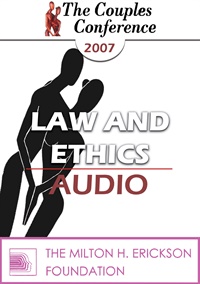
- Average Rating:
- Not yet rated
- Topic Areas:
- Law & Ethics | Therapist Development
- Categories:
- Couples Conference | Couples Conference 2007
- Faculty:
- A. Steven Frankel, PhD, JD, ABPP
- Duration:
- 3:39:34
- Format:
- Audio Only
- Original Program Date:
- Apr 26, 2007
- Short Description:
- The Law and Ethics Workshop covers emerging legal and ethical issues for mental health practitioners of all disciplines. The four-hour program addresses issues in- cluding confidentiality and privilege, note-taking, record-keeping, coping with sub- poenas, the impact of professional society ethical codes on regulation of mental health practice, liability exposure with suicidal patients, and recent developments in ''Tarasoff situations.''
- Price:
- $15.00 - Base Price
Tags: Ethics Law Therapist Development
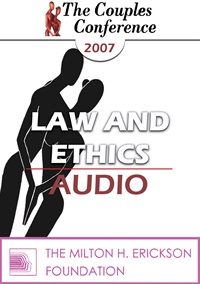
- Average Rating:
- Not yet rated
- Topic Areas:
- Law & Ethics | Therapist Development
- Categories:
- Couples Conference | Couples Conference 2007
- Faculty:
- A. Steven Frankel, PhD, JD, ABPP
- Duration:
- 1:41:00
- Format:
- Audio Only
- Original Program Date:
- Apr 26, 2007
- Short Description:
- This program focuses more closely on the needs of clinicians who fall into particularly high risk groups. Topics include confidentiality and privilege for children, coping with high-conflict divorce/custody families, the regressive impact of the regulatory environment on family therapy in particular, supervision/consultation issues that arise for professionals whose agency positions may include functions that conflict with ethical codes.
- Price:
- $15.00 - Base Price
Tags: Ethics Law Therapist Development
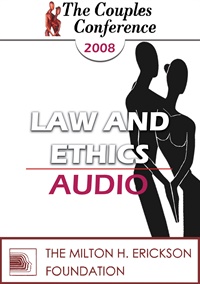
- Average Rating:
- Not yet rated
- Topic Areas:
- Law & Ethics | Therapist Development
- Categories:
- Couples Conference | Couples Conference 2008
- Faculty:
- A. Steven Frankel, PhD, JD, ABPP
- Duration:
- 3:27:00
- Format:
- Audio Only
- Original Program Date:
- Apr 24, 2008
- Short Description:
- The Law and Ethics Workshop covers emerging legal and ethical issues for mental health practitioners of all disciplines. The four-hour program addresses issues including confidentiality and privilege, note-taking, record-keeping, coping with subpoenas, the impact of professional society ethical codes on regulation of mental health practice, liability exposure with suicidal patients, and recent developments in “Tarasoff situations.”
- Price:
- $15.00 - Base Price
Tags: Ethics Law Therapist Development
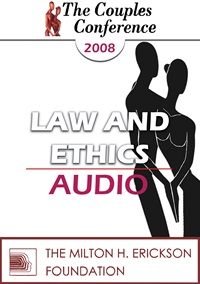
- Average Rating:
- Not yet rated
- Topic Areas:
- Law & Ethics | Therapist Development
- Categories:
- Couples Conference | Couples Conference 2008
- Faculty:
- A. Steven Frankel, PhD, JD, ABPP
- Duration:
- 1:48:58
- Format:
- Audio Only
- Original Program Date:
- Apr 24, 2008
- Short Description:
- This program focuses more closely on the needs of clinicians who fall into particularly high risk groups. Topics include confidentiality and privilege for children, coping with high-conflict divorce/custody families, the regressive impact of the regulatory environment on family therapy in particular, supervision/consultation issues that arise for professionals whose agency positions may include functions that conflict with ethical codes.
- Price:
- $15.00 - Base Price
Tags: Ethics Law Therapist Development
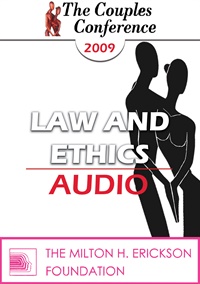
- Average Rating:
- Not yet rated
- Topic Areas:
- Law & Ethics | Therapist Development
- Categories:
- Couples Conference | Couples Conference 2009
- Faculty:
- A. Steven Frankel, PhD, JD, ABPP
- Duration:
- 3:34:47
- Format:
- Audio Only
- Original Program Date:
- Apr 30, 2009
- Short Description:
- The Law and Ethics Workshop covers emerging legal and ethical issues for mental health practitioners of all disciplines. The four-hour program addresses issues including confidentiali- ty and privilege, note-taking, record-keeping, coping with subpoenas, the impact of professional society ethical codes on regulation of mental health practice, liability exposure with suicidal patients, and recent developments in “Tarasoff situations.”
- Price:
- $15.00 - Base Price
Tags: Ethics Law Therapist Development
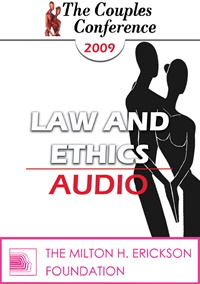
- Average Rating:
- Not yet rated
- Topic Areas:
- Law & Ethics | Therapist Development
- Categories:
- Couples Conference | Couples Conference 2009
- Faculty:
- A. Steven Frankel, PhD, JD, ABPP
- Duration:
- 1:45:43
- Format:
- Audio Only
- Original Program Date:
- Apr 30, 2009
- Short Description:
- This program focuses more closely on the needs of clinicians who fall into particularly high risk groups. Topics include confidentiality and privilege for children, coping with high-conflict divorce/custody families, the regressive impact of the regulatory environment on family therapy in particular, supervision/ consultation issues that arise for professionals whose agency positions may include functions that conflict with ethical codes.
- Price:
- $15.00 - Base Price
Tags: Ethics Law Therapist Development
Please wait ...

